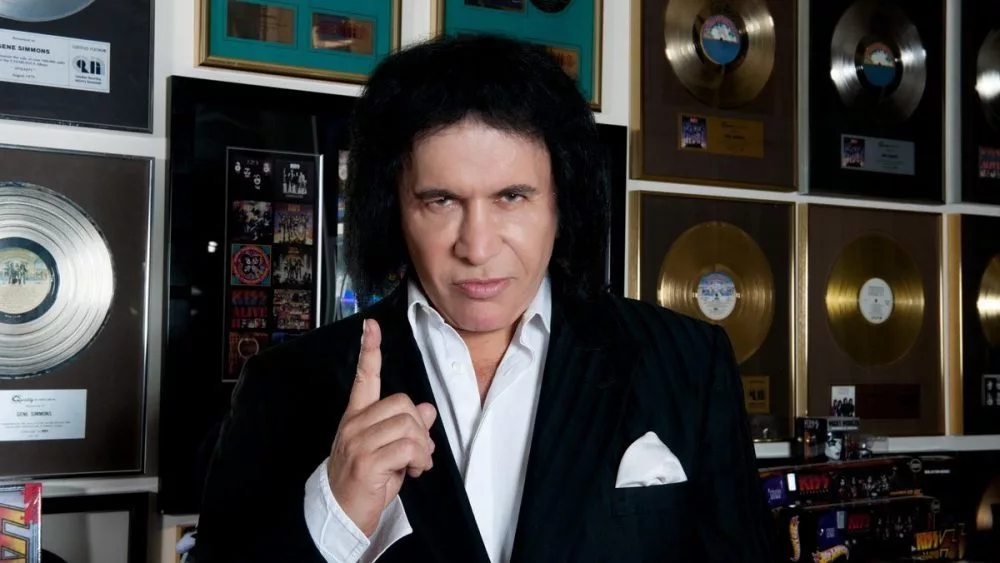
“You can work real hard or just fantasize,” was the ultimatum Kiss gave in 1991’s “God Gave Rock ‘N’ Roll to You II.”
Gene Simmons, turns out, chose both.
Entrepreneur, musician, Rock and Roll Hall of Famer, “Demon,” wealth manager, investor, provocateur, husband, father. The Kiss co-founder, 75, is many things to many people. To some he’s a pioneering showman, to others a cartoonish stage clown. Some, a baiting chauvinist, others a savvy music-industry businessman. Simmons would likely cop to all the above.
Whatever he is, the Israeli-born only son of a Hungarian Holocaust survivor who escaped poverty in the dirt streets of Haifa, he became all by himself.
Simmons, of course, is best known as the bassist in Kiss, the top-selling 1970s shock-rock juggernaut, as famous for their face makeup, party ethos and combustible live shows as for their music. “We only had a couple of hits,” Simmons conceded to NorthBay biz in a recent interview. “It’s been the brand” that’s lasted in people’s minds all these years.
Simmons was set to bring his personal brand to the North Bay this spring—the Gene Simmons Band, specifically. He and his post-Kiss group were slated to play Graton Resort & Casino in Rohnert Park on April 5, before Simmons suddenly and without explanation canceled the band’s April tour dates. Just prior to that, Simmons spoke with NorthBay biz about his philosophies on business, work and the power of knowledge. He canceled the Graton show a few days later. We hope it wasn’t anything we said.
Creating a brand
For the record, Kiss’s “only a couple of hits” includes such now-classic-rock staples as “Detroit Rock City,” “Beth,” “Deuce,” “Black Diamond” and “Rock and Roll All Nite,” among others—all christened in a three-year golden age of the band that influenced such later acts as Metallica, the Replacements, Nirvana, Guns & Roses, the Red Hot Chili Peppers and Lady Gaga, to name a few. And, as Simmons readily admits, Kiss’s musical impact on the industry was fleeting compared to its legacy as a brand. A business brand.
“When [Kiss] started, we decided we wanted to put together the band we never saw onstage,” says Simmons. “[In most concerts back then] you’d have a guy with an acoustic guitar staring at his shoes thinking he was doing you a favor playing for you because you’d bought a ticket.” When people make a choice to put their limited cash toward a concert ticket, the performer should put on a show worthy of it, Simmons believes. And that ethos was realized not only in Kiss’s music, but through its theatrical live shows—comic-book-inspired costumes, elaborate staging, dazzling lights and wild pyrotechnics. Simmons’ “The Demon” character was known for spitting blood and breathing fire. “Things would levitate!” Simmons proudly stresses.
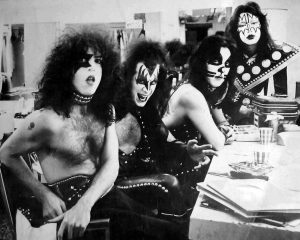
A decade before MTV, it was the beginning of rock growing beyond more than just music—it was becoming visual, it was becoming conceptual.
It was becoming entrepreneurial.
And Gene Simmons was taking notes.
The Demon in the North Bay
Kiss officially retired from touring at the end of 2023. While the members—Simmons, plus co-founder Paul Stanley, Eric Singer and Tommy Thayer—will no longer be taking the stage as Kiss, the band is planned to live on as avatars in fully digitized shows slated to premiere in 2027, what Simmons refers to as “the future of Kiss.” The Kiss brand was sold a year ago to Swedish company Pophouse Entertainment for a reported $300 million, a deal that included all songs and intellectual property.
While his “Demon” character may be behind him, Simmons is hardly slowing down. He’s part-owner (with Stanley) of the Rock & Brews restaurant chain, recently started a film-production company, helped launch Cool Springs Life Equity Strategy—a financial advisory group geared toward high-net-worth clients—and even owned an Arena Football League team until the LA Kiss folded following the 2016 season.
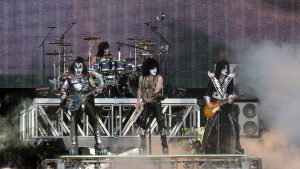
At the moment he’s most active with his Gene Simmons Band which, after canceling its April shows, will now launch its spring tour in May. “We play some Kiss, some cool covers and [promise] some other surprises,” he says of the tour, hinting that audience members may find themselves up on stage playing with the band at some point. For a price north of $12,000, a fan (and a plus-one) can be a “roadie for a day,” hanging out with band throughout the day of the concert.
While Simmons has yet to perform in the North Bay, he did venture north of the Golden Gate in the 1990s, when his now-grown kids were little and Marin-resident George Lucas “stole” his nanny.
“I got a call one day and the voice said, ‘Hi this is George!” recalls Simmons. “I said, ‘George who?”
Seems the Star Wars filmmaker wanted to hire the Simmons family nanny, Tawny, who’d developed a stellar reputation as a caregiver and teacher. Simmons demurred at first—“go get your own nanny!”—but Lucas’s offer of a large house on 2 acres and longtime financial security were too much to turn down. “Years later we came back for her wedding,” Simmons adds. In some ways, Lucas eventually returned the favor: His visual effects company Industrial Light & Magic created the Kiss avatars that will carry the band’s brand into the future.
Gene Simmons, Inc.
Simmons is also a sought-after speaker on the business lecture circuit, a career trajectory that followed the release of his 2014 book, Me, Inc., in which he details his various philosophies on business and life. His overarching theme is encapsulated in his concept of the “inferred fiduciary duty to yourself”—basically, what he sees as an inherent responsibility we each have to position ourselves to be as successful as possible. A big part of that fiduciary duty is through education—not necessarily a traditional classroom education, but through constant, life-long learning. Describing himself as a “voracious” reader who speaks four languages, Simmons urges young people to abandon their technology and read. “There used to be these buildings filled with things called books where people would go to read,” he oozes with OK Boomer sarcasm. He credits his constant reading of music-business publications in the early days of Kiss for much of the financial success the band enjoyed.
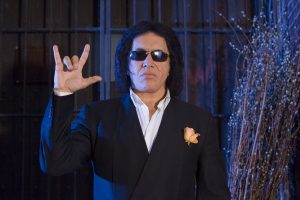
An unapologetic capitalist who ascribes to the job-creator-as-God line of thinking, he believes great wealth shouldn’t be met with suspicion but admired. “The rich are good!” he says, unequivocally.
“Even the worst billionaire—maybe a terrible person, not giving a penny to charity—still [through his business projects] you’re creating jobs,” says Simmons. “A poor person never gave me a job. And I was a poor person once myself.”
Simmons frames his business advice in simple terms—“for the great unwashed masses,” he says—with basic analogies. Work hard, spend wisely, learn everything you can about everything. He calls it a “Cliff’s Notes of life.”
A favorite analogy is the idea of everyone having two pockets of money: One pocket represents all the money going out—taxes, basic expenses, lifestyle purchases, non-necessities, vacations, etc. The other represents money going in—salary, investments, savings. Simmons wants as little money leaving the first pocket and as much going into the second as is possible. “How much I spend should be much less than how much I make.” At corporate events, he rejects the idea that someone could ever want “just enough money to get by” by posing a scenario in which audience members imagine that God has come to them and given them a choice between having more money in their pocket or less money: Which would they choose? “I want more,” he says, adding that “all sane human beings” would make the same choice. “I have a lot of money, but I don’t have enough money,” he told an audience of Google employees in a much-viewed online interview during his book tour in 2014. “More is a good word,” he says, like a latter-day Gordon Gecko. “Aspiration is a good thing.”
‘Not a popular thing’
Not all of Simmons’ life advice is as easily digestible. While the Google audience of well-paid Silicon Valley employees at the 2014 conference lapped up his permission to earn “more,” they weren’t as quick to absorb his objections to unions, federal funding for the arts, and government assistance for the needy (even food stamps), which the multi-millionaire dismisses as “handouts.” (As the half-hour Google interview came to a close, the audience sat in stunned silence. “It’s not a popular thing,” he conceded. “It gets quiet, you don’t like that.”)
He’s also quick to digress to questionable asides about the differences between men and women—typically reverting to shopworn conventions about women’s power existing in physical appearance, and men’s through the pocketbook. “It’s mankind,” he insists in our interview when crediting humanity’s progress through the centuries when women were generally stripped of power, before moving on to a lengthy observation about how women love to shop for shoes. (“How many pairs of shoes are in your wife’s closet?” he asks multiple times.) In 2002, Simmons made headlines for an interview he conducted with NPR’s Terry Gross, in which he repeatedly baited the Fresh Air host with men vs. women sexual innuendo, ending with her observing several times how “obnoxious” he is. More than 20 years later, he still plays that card.
Rock and roll all night…?
Few can quibble with Gene Simmons’ success. From a birth ward in Haifa (his given name is Chaim Witz) to emigrating to New York City at age 8 to founding one of the biggest rock bands of the 1970s, Simmons is genuinely one of the “self-made rich” he believes deserves far more appreciation from society.
That said, having a brand can only get one so far. While no official explanation of the canceled tour dates was forthcoming—aside from management stressing it had nothing to do with Simmons’ health—talk of poor-ticket sales quickly made the rounds on music websites, signaling the possibility that the Gene Simmons brand might struggle to hold its own when removed from the better-known Kiss brand. Simmons didn’t say how many North Bay residents had cut a $12,000 check to hang with him a “roadie for a day,” but one wonders whether any roadie refunds even had to be made.
Still, Simmons’ simple advice about the value of hard work, absorbing as much knowledge as possible, and spending the bulk of one’s time setting yourself up for success is hard to argue with.
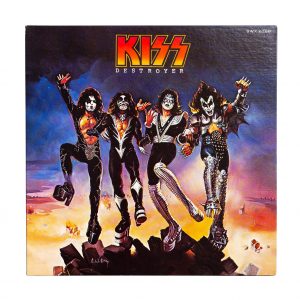
Though, where does that leave Kiss’s signature message: Should we or should we not, “rock and roll all night, and party every day”?
“No! Do, rock and roll all night and party every day!” stresses Simmons. Just have a fiduciary responsibility to yourself the rest of the time.
